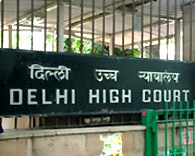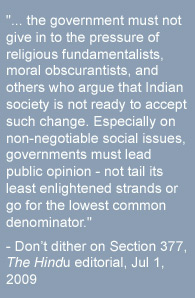Delhi High Court’s Chief Justice A P Shah and Justice S Muralidhar who concluded the hearings on the petition filed by HIV/AIDS NGO Naz Foundation seven months ago is expected to announce whether Section 377 IPC could be “read down” to decriminalise private consensual sex between adults of the same sex.

If the law is read down, Section 377 might still remain in the statute book as no other laws exist to deal with child sexual abuse and non-consensual sex between members of the same sex.
Media reports in recent days have quoted various religious leaders who expressed their opposition to reading down the 150-year-old British law.
The Times of India on Jul 1 quoted a statement issued by over a dozen prominent Muslim religious leaders saying: “Legalisation of homosexuality is an attack on Indian religious and moral values.”
The statement said that homosexuality is a sin and a social evil which will only lead to societal disintegration and break-up of the family. It further appealed to the government not to be influenced by the "decadent trends of the Western culture" and not to give in to the demands of a minuscule minority. It added that the government should not test the patience of the silent vast majority of the country which abhors such behaviour.
The Vishwa Hindu Parishad (VHP or World Hindu Council), right-wing Hindu organisation, has opposed any change to the status quo. "It [homosexuality] is against the culture and family system in India. It will result in the spread of a number of diseases. But we will see what changes, if at all, are introduced in the section,” its Delhi unit spokesman, Vinod Bansal, was quoted as saying in DNA India.
The report also quoted said Joseph Dias, general secretary of the Catholic Secular Forum as saying: “The Church's stand on the issue has always been clear. For us it is an unnatural act, against the divine law. We will definitely oppose it.”

Author Antara Dev Sen wrote in column published in DNA India on Wednesday: “Surely we can change laws in our ‘secular democracy’ without getting waylaid by religious demands. Of course some religious groups have grumbled at the idea of legally accepting homosexuality — but that’s their job. The government’s job is to ensure constitutionally guaranteed freedoms, to make sure that otherwise law-abiding citizens are not being discriminated against on the basis of sex, to protect everyone’s right to life and all its processes. It is not supposed to inflict religious demands on people, certainly not in the bedrooms of consenting adults. Sexual preference, like religion, is a personal matter.”
In a Jul 1 editorial titled “Don’t dither on Section 377”, The Hindu, one of India's top three newspapers, said: “In an age where there is growing acceptance of the idea that LGBTs must be allowed to live in dignity and respect, it is shame that India cannot bring itself to legalise gay behaviour. It is time the United Progressive Alliance did the right thing by either repealing Section 377 or (as some social activists have proposed) amending it so that it excludes consensual sex between all adults, whether of the same sex or otherwise. Having promised to review this provision, the government must not give in to the pressure of religious fundamentalists, moral obscurantists, and others who argue that Indian society is not ready to accept such change. Especially on non-negotiable social issues, governments must lead public opinion - not tail its least enlightened strands or go for the lowest common denominator.
The verdict will be the first to be delivered by an Indian court on a 19th century law that treats homosexual activity as a criminal offence. Britain and its former colonies of Australia, Fiji, Hong Kong, and New Zealand have struck down similar laws while Malaysia, Singapore, Bangladesh, Pakistan and Sri Lanka among others continue to criminalise gay sex.
Related articles:
- Don’t dither on Section 377 (The Hindu, Jul 1)
- Govt faces hurdles in repeal of anti-gay law (DNA India, Jun 29)
- 'Sodomy' Laws Show Survival of Colonial Injustice (Human Rights Watch)
